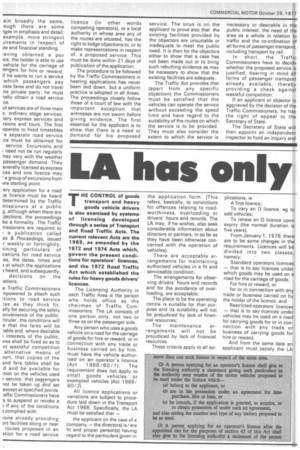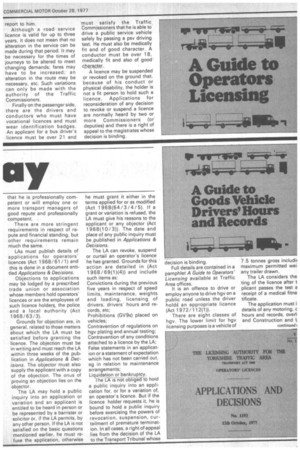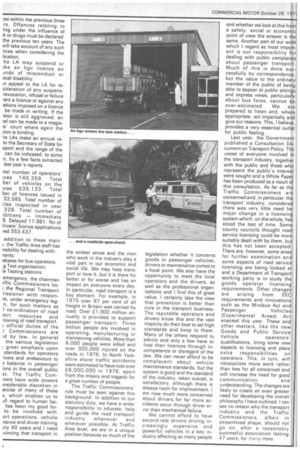LA has only
Page 48

Page 49

Page 50

If you've noticed an error in this article please click here to report it so we can fix it.
ay
THE CONTROL of goods transport and heavy goods vehicle drivers is also exercised by systems of licensing developed through a series of Transport and Road Traffic Acts. The current relevant Acts are the 1968, as amended by the 1972 and 1974 Acts which, govern the present conditions for operators' licences, and the 1972 Road Traffic Act which established the rules for heavy goods drivers' licences.
The Licensing Authority in each Traffic Area is the person who holds office as the chairman of Traffic Commissioners. The LA consists of one person only, not two or three as on the passenger side.
Any person who uses a goods vehicle on a road for the carriage of goods for hire or reward, or in connection with any trade or business carried on by him, must have the vehicle authorised on an operator's licence (Act 1968/60/1). The requirement does not apply to small goods vehicles or exempted vehicles (Act 1968/ 60/2).
All licence applications or variations are subject to procedure laid down in the Transport Act 1968. Specifically, the LA must be satisfied that — the applicant (in the case of a company — the directors) is/are fit and proper person(s) having regard to the particulars given in the application form. (This refers, basically, to convictions for offences relating to roadworthiness, overloading or drivers' hours and records. The LA may, if he wishes, also seek considerable information about directors or partners, in so far as they have been otherwise concerned with the operation of vehicles); There are acceptable arrangements for maintaining authorised vehicles in a fit and serviceable condition; The arrangements for observing drivers' hours and records and for the avoidance of overloading, are acceptable; The place to be the operating centre is suitable for that purpose and its suitability will not be prejudiced by lackof financial resources; The maintenance arrangements will not he prejudiced by lack of financial resources.
These criteria apply to all ap
plications, ie A first licence; To vary an 0 licence, eg to add vehicles; To renew an 0 licence upon expiry (the normal duration is five years).
From January 1, 1978, there are to be some changes in the requirements. Licences will be divided into two classes, namely: Standard operators licences — that is to say licences under which goods may be used on a road for the carriage of goods; For hire or reward, or for or in connection with any trade or business carried on by the holder of the licence, and Restricted operators' licences — that is to say licences under vehicles may be used on a road for carrying goods for or in connection with any trade or business of carrying goods for hire or reward.
And from the same date an applicant must satisfy the LA that he is professionally competent or will employ one or more transport managers of good repute and professionally competent. .
There are more stringent requirements in respect of repute and financial standing, but other requirements remain much the same.
LAs must publish details of applications for operators' licences (Act 1968/ 61 / 1) and this is done in a document entitled Applications & Decisions.
Objections to applications may be lodged by a prescribed trade union or association whose members hold operators' licences or are the employees of such licence holders„ the police. and a local authority (Act 1968/63/3).
Grounds for objection are, in general, related to those matters about which the LA must be satisfied before granting the licence. The objection must be in writing and must reach the LA within three weeks of the publication in Applications & Decisions. The objector must also supply the applicant with a copy of the objection. The onus of proving an objection lies on the objector.
The LA may hold a public inquiry into an application or variation and an applicant is entitled to be heard in person or be represented by a barrister or solicitor or, if the LA permits, by any other person. If the LA is not satisfied on the basic questions
mentioned earlier, he must refuse the application, otherwise
he must grant it either in the terms applied for or as modified (Act 1968(64/3/4/5). If a grant or variation is refused, the LA must give his reasons to the applicant or any objector (Act 1968(10/3)). The date and place of any public inquiry must be published in Applications & Decisions.
The LA can revoke, suspend or curtail an operator's licence he has granted. Grounds for this action are detailed in (Act 1968/69(1)(4)) and include such items as: Convictions during the previous five years in respect of speed limits, maintenance, weights and loading, licensing of drivers, drivers' hours and records, etc; Prohibitions (GV9s) placed on vehicles; Contravention of regulations on hgv plating and annual testing; Contravention of any conditions attached to a licence by the LA; False statements in an application or a statement of expectation which has not been carried out, eg in relation to maintenance arrangements;
Liquidation or bankruptcy.
he LA is not otiFged-to hold a public inquiry into an application for, or for a variation of, an operator's licence. But if the licence holder requests it, he is bound to hold a public inquiry before exercising the powers of revocation, suspension, curtailment of premature termination. In all cases, a right of appeal lies from the decision of the LA to the Transport Tribunal whose
decision is binding.
Full details are contained in a pamphlet A Guide to Operators' Licensing available at Traffic Area offices.
It is an offence to drive or employ anyone to drive hgv on a public road unless the driver hold a` an appropriate licence (Act 1972/112(1)).
There are eight classes of hgv. The lower limit for hgv licensing purposes is a vehicle of 7.5 tonnes gross includir maximum permitted wei any trailer drawn.
The LA considers the ting of the licence after t plicant passes the test a receipt of a medical fitne tificate.
The application must i details of any motoring, c hours and records, over1 and Construction and I. es within the previous three 's. Offences relating to ng under the influence of < or drugs must be declared he previous ten years. The vill take account of any such ices when considering the ication.
he LA may suspend or )ke an hgv licence on lnds of misconduct or iical disability.
n appeal to the LA for reiiideration of any suspensrevocation, refusal or failure -ant a licence or against any ations imposed on a licence be made in writing. If the
• ator is still aggrieved, an aI can be made to airnagis?s' court where again the 3ion is binding.
ie LAs make an annual reto the Secretary of State for sport and the range of the . can be indicated, to some it, by a few facts extracted last year's reports.
ital number of operators' ices 140,359. Total ber of vehicles on the' ices 536,133. Total ber of licences issued in 32,565. Total number of :,•les inspected in year 328. Total number of ibitions — Immediate 9. Delayedi17,981. No of Myers' licence applications ted 353,437.
addition to these main the Traffic Area staff has nsibility for dealing with: rants; ebates for bus operators; g Test organisation; le Testing stations.
emergency, the chairman iffic Commissioners be;..the Regional Transport iissioner with respon)s, under emergency legn, for such matters as I co-ordination of road )ort resources and tioning of road transport. ? official duties of the
Commissioners are td by law. In general the various legislation ; great emphasis upon standards for operators -ivers and endeavours to 3 balance in passenger ions in the overall public st. The Traffic Cornners have wide powers )nsiderable discretion in ercise of many of those s, which enables us to Al regard to human fac
has been my good forto be involved with ort operations, vehicle nance and driver training irly 40 years and I need vincing that transport in the widest sense and the men who work in the industry play a vital part in our economic and social life. We may hate transport or love it, but it is there for better or for worse and has an impact on everyone every day. In particular, road transport is a key element. For example, in 1975 over 87 per cent of all freight in Britain was carried by road. Over £1,000 million an nually is provided to support passenger transport. Three million people are involved in operating, manufacturing or maintaining vehicles. More than 6,000 people were killed and over 300,000 injured on the roads in 1976. In North Yorkshire alone traffic accidents were estimated to have cost over £6,000,000 in 1976, apart from the misery and tragedy for a great number of people.
The Traffic Commissioners' role must be seen against this background. In addition to our statutory duty, we have a wider responsibility to educate, help and guide the road transport industry whenever and wherever possible. At Traffic Area level, we are in a unique position because so much of the legislation whether it concerns goods or passenger vehicles, drivers or maintenance comes to a focal point. We also have the opportunity to meet the local operators and the drivers, as well as the professional organisations and I find this of great value. I certainly take the view that prevention is better than cure in the transport business. The reputable operators and drivers know this and the vast majority do their best to set high standards and keep to them. Many of the others respond to advice and only a few have to lose their licences through incompetence or disregard of the law. We can never afford to be complacent about vehicle maintenance standards, but the system is good and the standard of the industry, taken overall, is satisfactory, although there is always room for improvement. I am now much more concerned about drivers for far more accidents occur through driver error than mechanical failure.
We cannot afford to have second-rate drivers driving increasingly expensive and powerful vehicles in a key industry affecting so many people and whether we look at this f rarrr a safety, social or economic point of view the answer is the same. Another part of our work which I regard as most important is our responsibility for dealing with public complaints about passenger transport. Much of this is done successfully by correspondence, but the value to the ordinary member of the public of being able to appear at public sittings and express views, particularly about bus fares, cannot be over-estimated. We are prepared to listen and, where appropriate, act 'impartially and • give our reasons. This. I believe, provides a very essential outlet for public feeling.
Last year, the Government published a Consultation Document on Transport Policy. The views of everyone involved in the transport industry, together with the public and those who represent the public's interest were sought and a White Paper has been produced as a result of this consultation. As far as the Traffic Commissioners are concerned and, in particular, the transport industry, considered there was very little need for major change in a licensing system which, on the whole, has stood the test of time. Some county councils thought road service licensing could be more suitably dealt with by them, but this has not been accepted. There are, however, some areas for further examination and some aspects of road service licensing are being looked at and a Department of Transport working party is to study the goods operator licensing requirements. Other changes are arising from EEC requirements and innovations such as the Minibus Act and Passenger Vehicles (Experimental Areas) Act enacted this year. These and other matters, like the new Goods and Public Service Vehicle operators' qualifications, bring some new aspects to licensing and place extra responsibilities on operators. This, in turn, will necessitate more work rather than less for all concerned and will increase the need for good communication and understanding. The changes are likely to create an even greater need for developing the overall philosophy I have outlined. I can see no reason why the transport industry and the Traffic Commissioners, albeit in streamlined shape, should not go on, after a reasonably successful association lasting 47 years, for many more.




















































































































